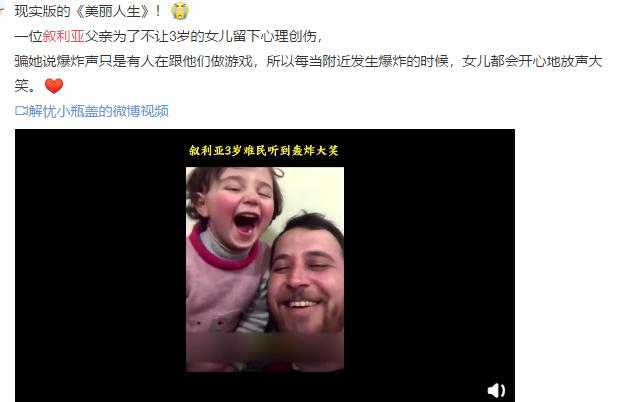Recently, the story of a Syrian father and daughter has caused a hot discussion on the Internet.
In order not to let his 4-year-old daughter have war trauma, the father in the story tells the child that the bomb explosion is part of the game, and laughs with his daughter when the explosion is agreed.

This little girl is unfortunate, in the midst of war, and danger can come at any time.
At the same time, she is also fortunate that her parents can be by her side and carefully care for her soul with "white lies".
But what about children who have lost their parents in a war environment?
Without protection, what is their life like?
Today's recommended movie will tell you the answer - "Turtles Can Fly"
The film is set on the eve of the U.S. military's attack on Iraq and the launch of the Iraq War.
In a refugee camp in the border area between Iran and Turkey.
A 13-year-old boy is helping people install tv antennas in order to keep up to date on the war.
The boy's name was Sharon, but everyone called him Satellite.
With a clever mind and eloquent eloquence, satellites became the famous "child king" of the area.
Not only children, but also adults can't do without him.
The satellites admired the United States, identified the United States as their savior, and inadvertently learned a few simple words of English.
Whenever the news of the U.S.-Iran war was broadcast on television, the adults always asked him to help translate it.
However, he could not understand it, and could only perfunctory.
In a war environment, survival is cruel.
In order to survive, you have to risk doing some dangerous work, such as digging mines.
Mines dug out can be bought for hawkers to earn living expenses.
As a satellite of the "Child King", he will lead a group of small followers to dig mines every day.
And due to personal preference, the satellite will arrange for them to go.
On this day, the satellite unexpectedly found that the little follower was not in the place he had arranged.
After questioning, it was learned that it was an armless teenager who had called them somewhere else.
There were more, but all of them were Italian-made mines.
The satellite felt its authority threatened.
In a fit of anger, he clashed with the other party and was stopped by others in time.
The armless boy, Han Gaofu, had just arrived in the village.
Along with him came his sister Atherine and a little boy with a disability in his eyes, Riga.
Hankov was a special man, with the ability to foresee the future.
Both predictions allowed Satellite and his little henchman to successfully escape from danger.
Since then, satellites have been convinced of his ability to predict.
For his sister Atherine, Satellite was love at first sight.
Atherine was dressed in red, but her expression was gloomy and gloomy.
Still, Satellite liked her.
Take the opportunity to help fetch water and confess to Atherine.
She also jumped into the deep water twice to find the "red fish".
Satellite pursues it, but does not understand what Atherine thinks.
He didn't know that Atherine had had an unbearable experience—she had been raped by the Iraqi army.
And also gave birth to a child, that is Riga.
Disgusted by her ruined self, Atherine tried to set herself on fire.
He also hated Riga, calling him "the devil" and wanting to throw him away.
But his brother Hankov always treated Riga as a family.
Once, Hangoff lost his hands in an accident while digging mines.
Now, in order to feed his sister and nephew, he had to lie on the ground and carefully remove the mines with his mouth.
However, things are not so simple.
Disgust and guilt erode Atherine day by day, making her miserable.
Finally, one morning, while Hangoff was asleep, Riga was discarded on the hillside.
Unfortunately, Riga accidentally broke into the minefield and was discovered by the satellite's small follower.
Satellite Adventure rescued him, but was blown up in the leg.
At night, Atherine, who returned home, was surprised to find Riga asleep in bed. He took him to the edge of the deep pool, tied him to a stone, and sank to the bottom like a turtle.
He jumped off the cliff and completed his self-redemption.
Also that night, Saddam Hussein's regime was breached and U.S. troops officially entered Iraq.
But this is not the end of the war, just the beginning of another war.
The mines exchanged for money were turned into fragments of Saddam's statue.
Nothing has changed.
The "turtle" in the title represents the children who carry the mission of survival in war.
Beneath the seemingly strong exterior is a childishness.
Even if you have a disability, you must grit your teeth and persevere.
They may even be miserable.
Like The Film's Parsio, who is satellite's right-hand man who broke a leg during a mine-digging job in the past, he can only carry a crutch at all times.
To amuse others, he would sometimes raise his crippled leg, pretend to be a machine gun, and "fire" at the Barbed-Wire Turkish sentry not far away.
The cruelty of war urges children to learn to fly on their own.
As the war drew nearer, satellites had to rent guns with mines, lead their followers to dig trenches, build fortifications, and take up weapons with hands that should have picked up pens.
Hangoff could have predicted, but couldn't make changes.
Nor is the United States the savior that satellites expect.
As long as the war continues, no matter who sets foot on this land, people will have to live in their own homes.
It is worth mentioning that the actors in the film are real refugees, and the disabilities on their bodies are also real.
——end——